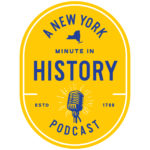
On this “extra innings” episode of A New York Minute In History, co-hosts Devin Lander and Lauren Roberts chronicle the life of Troy native Johnny Evers. In the early 20th century, the scrappy, slender and fiercely competitive infielder had a Hall of Fame career, but is perhaps best known for his role in the famed “Tinker to Evers to Chance” poem, also known as Baseball’s Sad Lexicon.
Evers’ great grandnephew, also named Johnny Evers, details what made his noted relative so successful on the field and explains how the poem came to be.
For more baseball history, check out our episode on the game’s development in the 19th century.
Thanks to Johnny Evers for his help with the episode.
Music used in this episode of A New York Minute In History includes “Begrudge” by Darby and “Hash Out” by Sunday at Slims.
A New York Minute In History is a podcast about the history of New York and the unique tales of New Yorkers. It is hosted by Devin Lander, the New York State Historian, and Saratoga County Historian Lauren Roberts. WAMC’s Jim Levulis is the producer. A New York Minute In History is a production of the New York State Museum, WAMC Northeast Public Radio and Archivist Media.
Support for this podcast comes from the William G. Pomeroy Foundation®, which helps people celebrate their community’s history by providing grants for historic markers and plaques. Since 2006, the Foundation has expanded from one to six different signage grant programs, and funded nearly 900 signs across New York State and beyond … all the way to Alaska! With all these options, there’s never been a better time to apply.
The Foundation’s programs in the Empire State include commemorating national women’s suffrage, historic canals, sites on the National Register of Historic Places, New York State’s history, and folklore and legends. Grants are available to 501(c)(3) organizations, nonprofit academic institutions, and municipalities. To apply for signage at no cost to you, or to learn more about the Foundation’s grant programs, visit WGPfoundation.org.
This program is also funded in part by Humanities New York with support from the National Endowment for the Humanities. Any views, findings, conclusions or recommendations expressed in this podcast do not necessarily represent those of the National Endowment for the Humanities.

